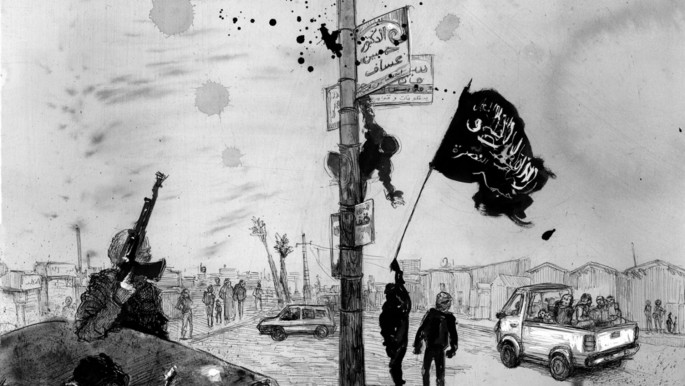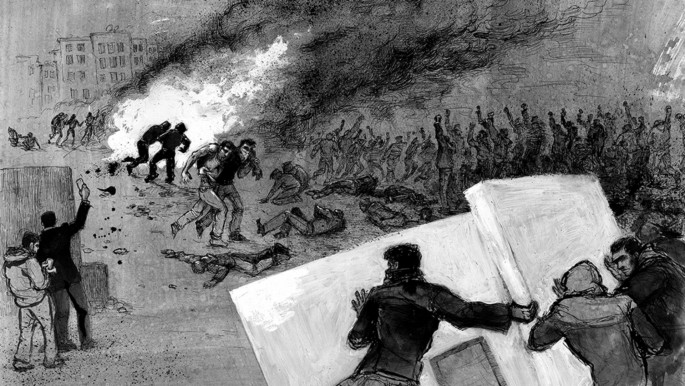Brothers of the Gun: A searing memoir of Syria's brutal war
The powerful memoir tells the story of journalist Marwan Hisham and his two closest friends as they navigate the collapse of their country – from hopeful revolution to a descent into hell.
A coming of age tale set against the backdrop of war, Brothers of the Gun examines universal questions of identity, community, and hope, as three friends take divergent paths in the unfolding conflict.
The painful, personal testimonial of Syria's brutal war – which has seared the world's conscience – is illustrated by the stunning artwork of award-winning artist and journalist Molly Crabapple.
The New Arab spoke to Hisham and Crabapple about their latest collaboration:
The New Arab: What inspired you both to begin this project?
Molly Crabapple: Marwan and I began working together in 2014. We met on Twitter and were both members of a small circle of people discussing the Syrian war. In the beginning, I interviewed Marwan for articles I was writing about life under the Islamic State group in Raqqa, where he was living at the time.
 |
Syrians are so dehumanised in America - reduced to either refugees or pitiful terrorists. We wanted to make a book that shows Syrians and the Syrian war in all its complexity and nuance - Molly Crabapple |
 |
We became closer as I studied Arabic, and I asked him in the summer of 2014 if he would send me photos of Raqqa he might have on his phone.
Instead, being the impossibly brave journalist he is, he went around the city taking photos of daily life, even though he would have been arrested and killed as a spy if he was caught. I drew from those photos.
We repeated the experiment in Mosul and rebel-held East Aleppo. The reaction was such that we decided we wanted to do something bigger – an illustrated memoir about the revolution and war.
Marwan Hisham: When Molly first proposed to me the idea of making illustrations out of my photos of Raqqa, I had been waiting for an opportunity to take advantage of living in a warzone inaccessible to journalists. We weren't aware of any similar projects done about Raqqa so I didn't hesitate, despite the risk involved.
 |
|
| [Molly Crabapple] |
The New Arab: Molly, the artwork is stunning. What inspiration or references did you use to create your pieces?
Molly Crabapple: While initially I drew from Marwan's photographs, many of the scenes in the book were ones that he had not, and could not, shoot pictures of. For these I relied on citizen video and photos, pictures I took in Turkey, and most importantly, Marwan's memory.
I interviewed him for many pieces and did countless sketches that he art directed to make sure that I had accurately portrayed his truth.
 |
My friend Tareq was pulled into the realities of war the moment his older brother was killed. He thought he had no other option - Marwan Hisham |
 |
The New Arab: Marwan, as a memoir, the book recounts traumatising experiences of a brutal war. Was the process cathartic or sorrowful? What kind of emotional journey did the project take you on?
Marwan Hisham: I think more of the first. But the emotional journey wasn't the most important one anyway. I think what was more important to me were the ethical and intellectual journeys.
Challenging myself, my society's traditions, convictions and understandings of religion. The way we viewed life in the first place, and our position in the world. All these topics are the ones we most needed to address.
 |
|
| [Molly Crabapple] |
The New Arab: The book traces the divergent paths of three friends. What makes people make such different decisions during war?
Molly Crabapple: War both constrains people's choices radically but also, occasionally, opens them up to unimagined possibilities, like, say, a New York artist and a Raqqan writer teaming up to do a book like this. Often, luck and externally imposed identities are the two things that most shape one's choices.
 |
War both constrains people's choices radically but also, occasionally, opens them up to unimagined possibilities - Molly Crabapple |
 |
Marwan Hisham: Wars stir up emotions and evoke senses of responsibility, as well as a sense of history. They also drive people to react, and often remaining idle is simply not an option.
Some see opportunities and ends to aim for; others find themselves compelled to react instinctually. My friend Tareq was pulled into the realities of war the moment his older brother was killed. He thought he had no other option.
 |
|
| [Molly Crabapple] |
The New Arab: The daily human tragedies of the Syrian war have been eclipsed by a war of narratives. What do you both hope that people get from this book?
Molly Crabapple: Syrians are so dehumanised in America – reduced to either refugees or pitiful terrorists. We wanted to make a book that shows Syrians and the Syrian war in all its complexity and nuance.
Marwan Hisham: People outside also don't hear enough about the lives of ordinary people in war-torn areas, but more importantly, they find it hard to understand either fighters' or civilians' behaviours, or the motivations that lead to their behaviours.
One important goal of this book is to bring this picture closer to the interested reader, so they can understand how seemingly irrational actions could make sense in the context of war.
Some people, however, will hear only what they want to hear. Some people, until today, even deny the Holocaust. Many are hostages to governments' propagandas. This book is for the independent.
 |
People outside also don't hear enough about the lives of ordinary people in war-torn areas [...] they find it hard to understand either fighters' or civilians' behaviours - Marwan Hisham |
 |
The New Arab: What are your hopes and dreams for the Syrian people?
Molly Crabapple: I hope for a world not determined by borders, where war criminals face justice and people can define their own destinies, no matter where on the map they are born.
Marwan Hisham: An end to war in a certain situation when people don't need to pretend that they want to give up their rights or hide their allegiances. Whatever solution that's practical that suits Syrians first and not the inhabitants of palaces thousands of miles away.
Charlie Hoyle is a Middle East-focused journalist at The New Arab specialising in Palestinian affairs.
Follow him on Twitter: @CharlieCHoyle
The New Arab Meets: Click on our Special Contents tab to read more on our ever-growing archive of interviews





 Follow the Middle East's top stories in English at The New Arab on Google News
Follow the Middle East's top stories in English at The New Arab on Google News


